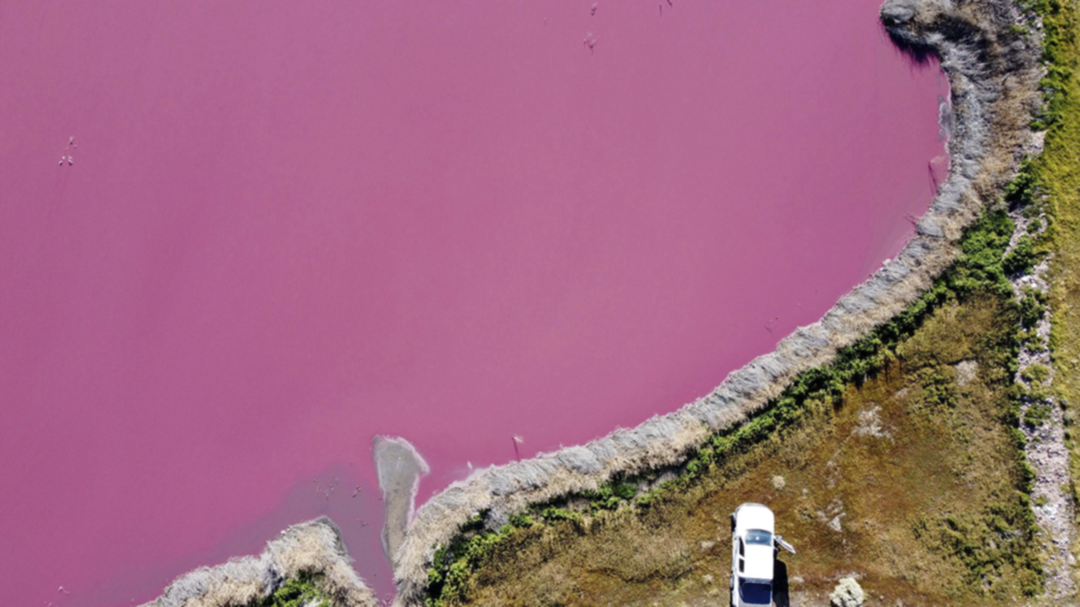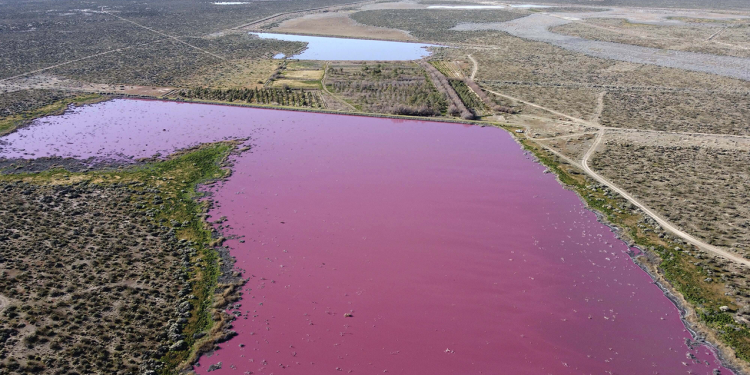-
Argentine lake turns pink due to pollution

The Honey Travel website reported the phenomenon of pink lakes is a major tourism drawcard for some countries, with tourists flocking to view the surreal attraction. Argentine lake
Unfortunately, Argentina won't be promoting their recently-formed pink lake on tourism posters any time soon.
Locals became concerned after lakes on the outskirts of the Argentine city of Trelew turned a bubblegum pink, quite suddenly.
Authorities have since uncovered a truck disposing of waste in the region's network of lagoons, according to social media posts shared by the city.
While no details have been provided on whether the polluted water is indeed toxic, environmentalists have been speculating on the possible causes.
One theory is that the pastel hue comes from the dye used at prawn farms to give the crustaceans their pink colour, as there are some such farms within close proximity to the lakes.

In naturally-occurring pink lakes, the hue is commonly caused by a specific type of algae called Dunaliella salina that grows within the salt crust on the lake's floor. It's the carotenoid red pigments secreted by these bacterias or algae that are responsible for the millennial pink transformation.
In the case of Australia's most famous pink lake, Lake Hillier in Western Australia, both Halobacteria and the Dunaliella salina algae are behind the body of water's Instagrammable hue.
Lake Hillier is a wildly popular tourism attraction in the region, with travellers able to take in the surreal lake by boat or in the air on a scenic joy flight.
Australia boasts a number of pink salt lakes, some of which are temporary and dependant on the seasons.
A few years ago, Melbourne residents were shocked when Westgate Lake turned pink almost overnight (watch the footage above). The lake only goes through such a seasonal fairy floss-like transformation when the water experiences a perfect combination of saltiness, high temperatures, increased sunlight and low rainfall.
Lake Eyre is one of Australia's more famous salt lakes, despite only flooding every 3-10 years. It occasionally takes on a pale bubblegum colour, and if you're lucky enough to visit during one of these floods, it's a sight to behold.
levant
Source: honeytravel
Image source: AP-honeytravel
You May Also Like
Popular Posts
Caricature
BENEFIT Sponsors BuildHer...
- April 23, 2025
BENEFIT, the Kingdom’s innovator and leading company in Fintech and electronic financial transactions service, has sponsored the BuildHer CityHack 2025 Hackathon, a two-day event spearheaded by the College of Engineering and Technology at the Royal University for Women (RUW).
Aimed at secondary school students, the event brought together a distinguished group of academic professionals and technology experts to mentor and inspire young participants.
More than 100 high school students from across the Kingdom of Bahrain took part in the hackathon, which featured an intensive programme of training workshops and hands-on sessions. These activities were tailored to enhance participants’ critical thinking, collaborative problem-solving, and team-building capabilities, while also encouraging the development of practical and sustainable solutions to contemporary challenges using modern technological tools.
BENEFIT’s Chief Executive Mr. Abdulwahed AlJanahi, commented: “Our support for this educational hackathon reflects our long-term strategic vision to nurture the talents of emerging national youth and empower the next generation of accomplished female leaders in technology. By fostering creativity and innovation, we aim to contribute meaningfully to Bahrain’s comprehensive development goals and align with the aspirations outlined in the Kingdom’s Vision 2030—an ambition in which BENEFIT plays a central role.”
Professor Riyadh Yousif Hamzah, President of the Royal University for Women, commented: “This initiative reflects our commitment to advancing women in STEM fields. We're cultivating a generation of creative, solution-driven female leaders who will drive national development. Our partnership with BENEFIT exemplifies the powerful synergy between academia and private sector in supporting educational innovation.”
Hanan Abdulla Hasan, Senior Manager, PR & Communication at BENEFIT, said: “We are honoured to collaborate with RUW in supporting this remarkable technology-focused event. It highlights our commitment to social responsibility, and our ongoing efforts to enhance the digital and innovation capabilities of young Bahraini women and foster their ability to harness technological tools in the service of a smarter, more sustainable future.”
For his part, Dr. Humam ElAgha, Acting Dean of the College of Engineering and Technology at the University, said: “BuildHer CityHack 2025 embodies our hands-on approach to education. By tackling real-world problems through creative thinking and sustainable solutions, we're preparing women to thrive in the knowledge economy – a cornerstone of the University's vision.”
opinion
Report
ads
Newsletter
Subscribe to our mailing list to get the new updates!






















